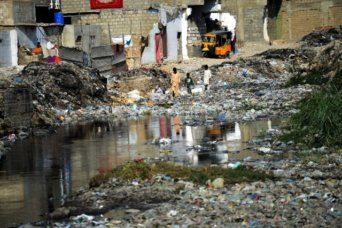- About
- Topics
- Picks
- Audio
- Story
- In-Depth
- Opinion
- News
- Donate
- Signup for our newsletterOur Editors' Best Picks.Send
Read, Debate: Engage.
| topic: | Good Governance |
|---|---|
| located: | Pakistan |
| editor: | Shadi Khan Saif |
Nothing can hide the deteriorating state of affairs in a country where those in power can simply not keep the biggest city functioning during a short period of rainfall.
Karachi, a metropolis of some 20 million inhabitants in Pakistan, was once a bustling city, often called the ‘city of lights’. But this moniker sounds absurd today.
The major sewerage lines, as well as the inner-city sanitation lines, simply chocked yet again this monsoon season, causing losses of lives and property besides utter nuisance on a mammoth scale.
The city was engulfed in filthy sewerage water for days while the messy electric lines posed another deadly threat to the city dwellers.
As cities worldwide lead global sustainable development initiatives such as green energy, the fight against plastic bags and other innovative ideas, Karachi has been left to the mercy of multiple ruling parties on different tiers of the administration, who are engulfed in mud-throwing at one another. While the city dwellers – particularly the poor ones living on the margins of society – continue to bear the unbearable.
Rather than creating spaces for forestation and rainwater collection in and around a city that faces crippling water crisis, the ruling quarters remain indifferent and in fact involved in land-grabbing on key sanitation routes, causing the chocking of the sewerage system in the first place.
This port city needs 1.1 billion gallons of water a day to survive, but it is only receiving roughly half of that via the Karachi Water and Sewerage Board (KWSB) – a public entity – while up to forty percent of the supply comes from largely illegal and some legal tanker trucks that charge up to $25 for one trip.
Major corporate giants, particularly in the property sector have been relentlessly reclaiming the shoreline in Karachi, posing threats to the marine life and native fishermen community. On top of this, the blind quest for the nuclear and coal energy on the outskirts of the city would only serve as a ticking time bomb.
